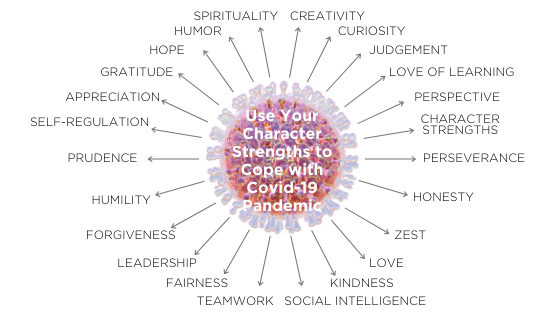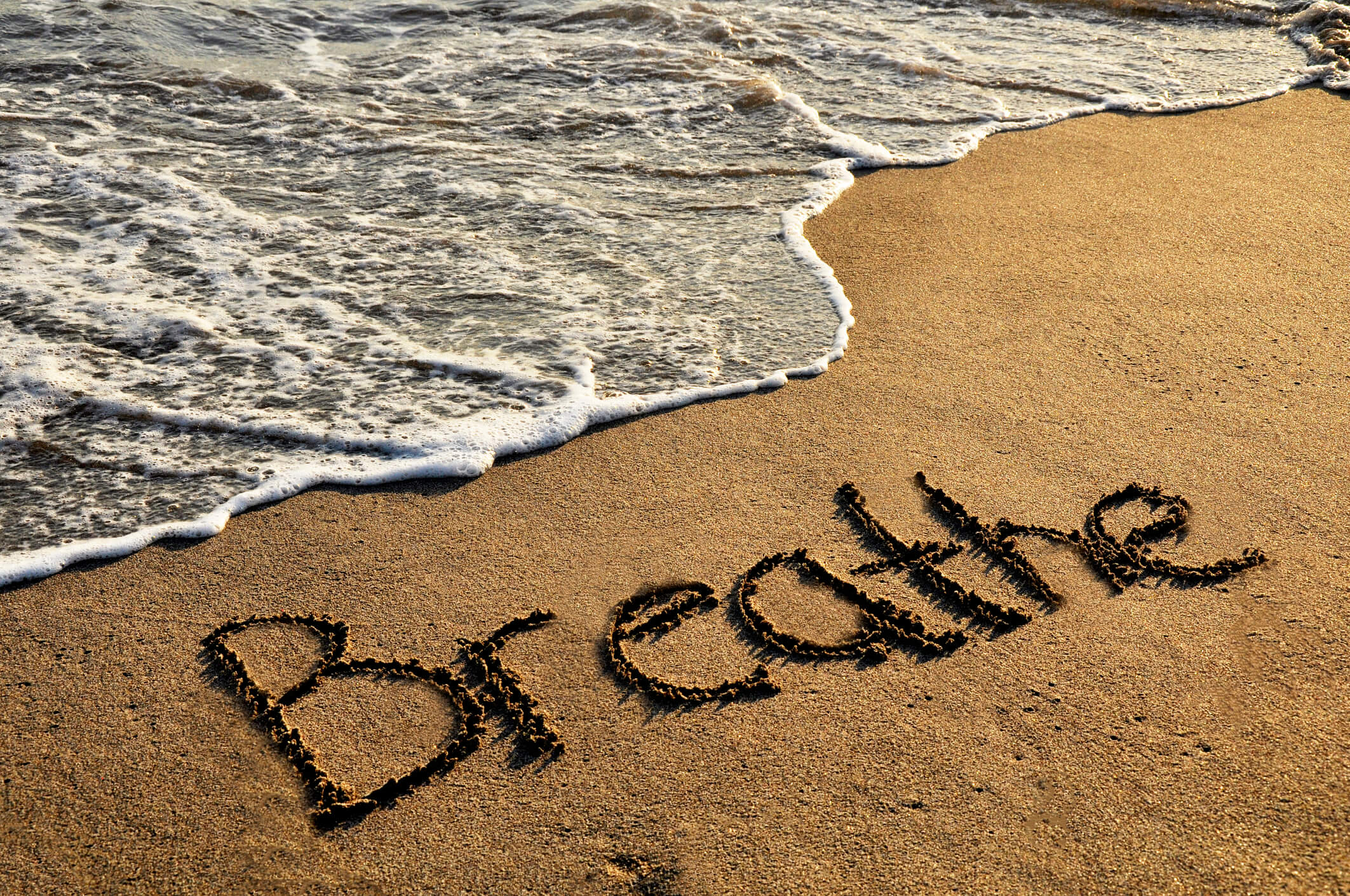How are you coping with this global pandemic? With so much uncertainty still looming over the COVID-19 virus itself, it seems we won’t be settling into a new normal quite yet. The VIA Institute 24 Character Strengths can help. Since our human brain is hard-wired to persevere in traumatic situations, history has shown us that we can survive this. We all possess these 24 character strengths and expressing these traits through our thoughts and actions has been shown to help us feel more content, connected, productive, and improves our ability to cope and build resilience during uncertain times. Let’s explore and practice these 24 character strengths that will allow you to cope daily.

Photo credit to Ozum Demirel
The VIA Institute: 24 Character Strengths
1. SPIRITUALITY: Purpose & Meaning
Finding purpose and meaning to your daily life builds character strength. By exporing the collective meaning of this pandemic for humanity, it makes us feel more connected to one-self and others. Consider engaging in spiritual practices to cultivate peace and connection
2. CREATIVITY: Originality
Using your creativity helps make gives human beings a sense of pride and a feeling of peace. Engage in creative activities during the lock-down and generate alternative solutions to schedule changes.
3. PLAYFULNESS: Humor
By cultivating a playful attitude in conversation, you create a coping mechanism that helps with your everyday attitude. Educate yourself and others with humor. Laughter IS the best medicine!
4. CURIOSITY: Exploration & Openness
Exploration of a new topic allows for deeper curiosity and serves as a great distraction. Be open minded and without judgement when you gather reliable information about COVID-19.
5. HOPE: Optimism & Future Mindedness
There is nothing quite like the feeling of hope. It cultivates a sense of optimism and exerts effort for our collective healing. Set a personal goal and generate alternative pathways with hope.
6. JUDGEMENT: Critical Thinking & Rationality
Critical thinking about COVID-19 is healthy. Challenge your own biases while gathering information. As well, make rational decisions with consideration of your fellow man and public health.
7. GRATITUDE: Thankfulness
Show gratitude for health-care workers and other Heroes taking the front line during this global pandemic. As well, write down 3 things you are grateful for each night.
8. LOVE OF LEARNING: Systematic and Deep Learning
Ongoing education and love of learning are crucial for our brain health. Take this time to master a new skill or sign up for an online course. It’s a great opportunity to learn about VIA Character Strengths as well.
9. APPRECIATION OF BEAUTY & EXCELLENCE: Be in awe
Learn to appreciate and be in “awe” of nature’s beauty by taking random walks. Jump online for a virtual visit to world museums and other beautiful places of interest.
10. PERSPECTIVE: Wisdom & View of the Big Picture
Life is all about perspective and wisdom gives you a better view of the big picture. Use a global and collective lens in your decision-making and consider the historical significance of COVID-19 for humanity.
11. SELF-REGULATION: Self-Control
During this stressful time, explore mindfulness to regulate your emotions.
Choose as well to regulate physical and digital consumption for a healthier perspective. There is a lot of pride to be taken for practicing self-control.
12. BRAVERY: Courage & Valor
Be brave! Use the many online platforms to speak up and stand with your truth. Show the courage to support fellow human beings in your community and outside who need help through this crisis.
13. PRUDENCE: Wise Caution
Staying home is a wise decision at this time. If you need to go out, wash your hands, and apply social distancing. Be sure to boost your immune system as well with nutritious food and supplements.
14. PERSEVERANCE: Persistence & Industry
It is through perseverance that success is achieved. Give positive feedback to yourself and others for their effort and remember, “This is global crisis, so hang in there with us!”
15. HUMILITY: Modesty
Always show humility against the power of Earth and practice traits to feed your humble nature. Whether it’s prayer or meditation, always be mindful and show modesty to things out of human control.
16. HONESTY: Authenticity & Integrity
Use online platforms to express honesty and authenticity but using a respectful voice with integrity. Reflect on your personal thoughts and emotions about this pandemic.
17. FORGIVENESS: Mercy & Acceptance of Shortcomings
Show yourself and others the fruits of forgiveness. Realize that we all make mistakes and that this pandemic is new to everyone Have mercy for yourself and others and in return have peace.
18. ZEST: Energy & Vitality
Work on your vitality by taking joyful walks in nature or exercising at home. Try meditation and breathwork to increase your energy level. Enjoy zest of life in quarantine we never could when we were busy working.
19. LEADERSHIP: Organizing Group Activities
Show leadership qualities by creating a positive influence on the groups you belong to. Organize groups and group activities for social service during this crisis where you see the need to be filled.
20. LOVE: Love is Love!
We all need LOVE more than ever, so love anything and anyone you can. Love given is love in return. As well, love the service you can bring to support others during this pandemic. Show love where you are needed. The reward is great.
21. FAIRNESS: Justice Based Moral Reasoning
We all crave justice and fairness in this world. Speak up for equal health care and social justice, amongst other valuable causes. As well, be fair and respect the legitimate fears of your fellow man by being considerate of others while shopping.
22. KINDNESS: Altruism, Care & Compassion
Practice kindness and compassion for yourself and others during these tough times. Show an act of random kindness to help your local community and if you are taking care of someone, do with your whole heart.
23. TEAMWORK: Social Responsibility & Citizenship
You are a local member of the global team fighting against COVID-19. We have a social responsibility to each other because we are all in this together. Respect and consider your teammates!
24. SOCIAL INTELLIGENCE: Emotional Intelligence
Build social connections and awareness on digital platforms and use personal intelligence to ease social interactions during this stressful time. Although we cannot unite physically, we are called to unity in spirit.
Fear and anxiety surround this global pandemic but with the proper survival skills, we will persevere. The VIA Institute 24 character strengths offer wonderful skills to find peace and productivity during this COVID-19 pandemic and gives us the ability to cope with the COVID-19 pandemic and with any curveball life may throw at us. Dig in, practice daily, and have fun! For more, visit: Via Institute: On Character
About the author:
Nora Kassay-Farkas is the Lead Functional Medicine Health Coach and Natural Nutrition Clinical Practitioner at Linden & Arc Vitality Institute. Nora is pleased to provide nutrition consultations and Functional Medicine health coaching to you in your journey to wellness. She offers sessions for CIRS, Brain Health, weight loss, and supports Autoimmune conditions. Contact Nora at: [email protected]





